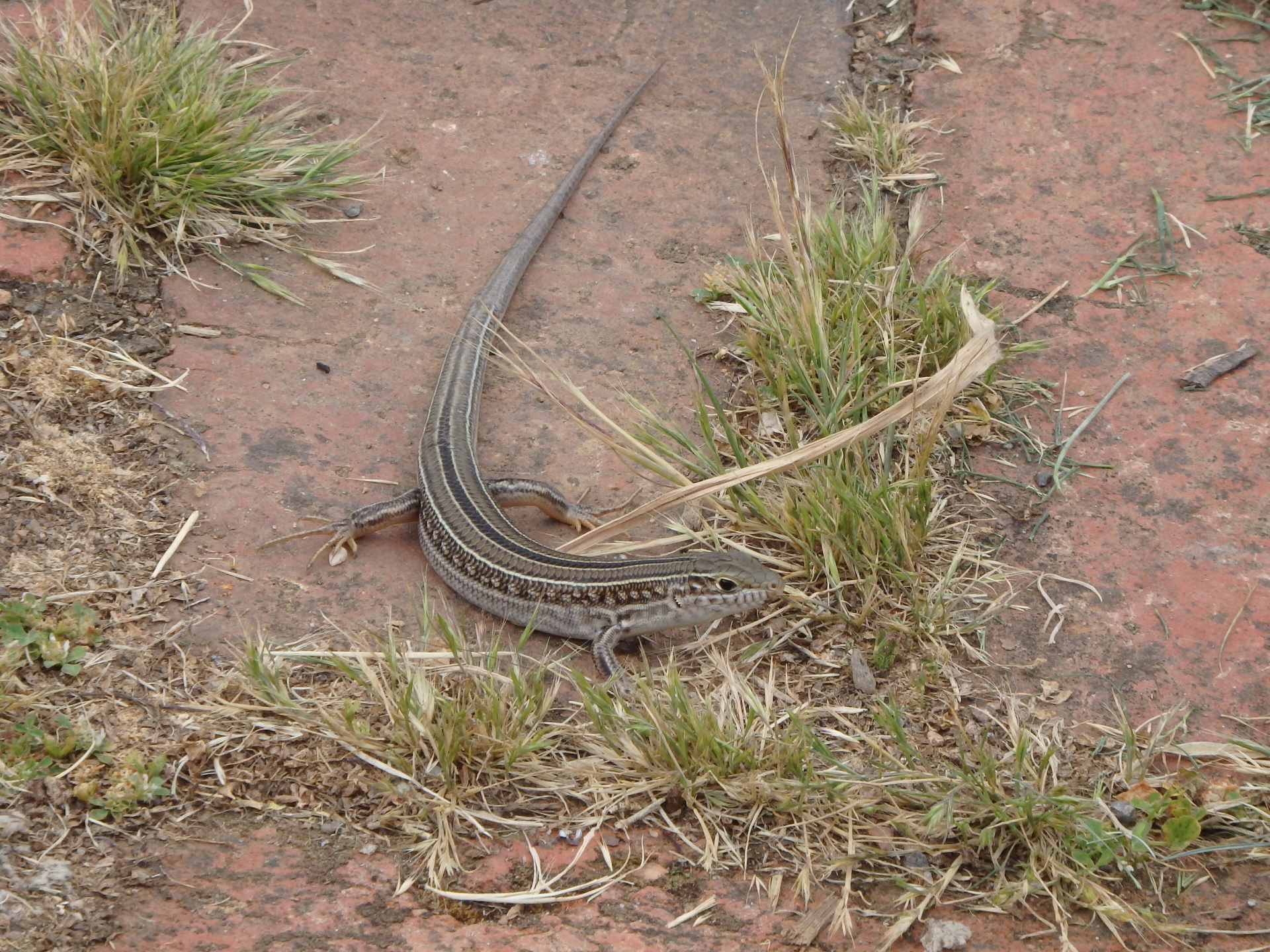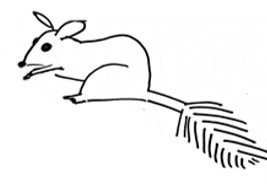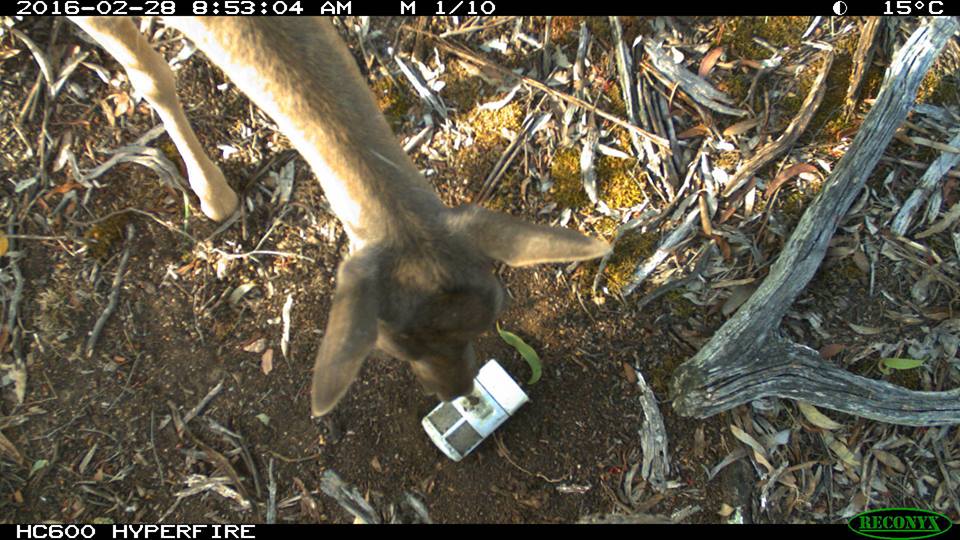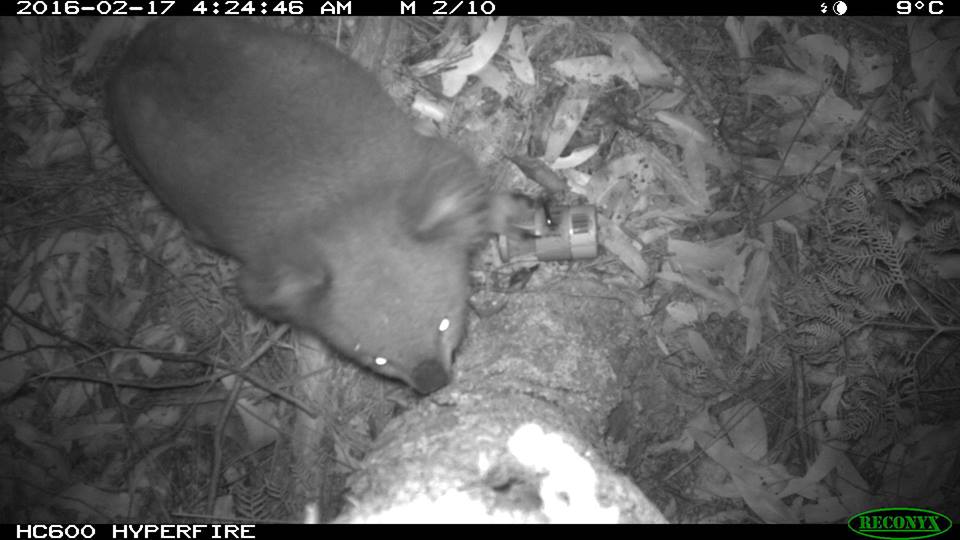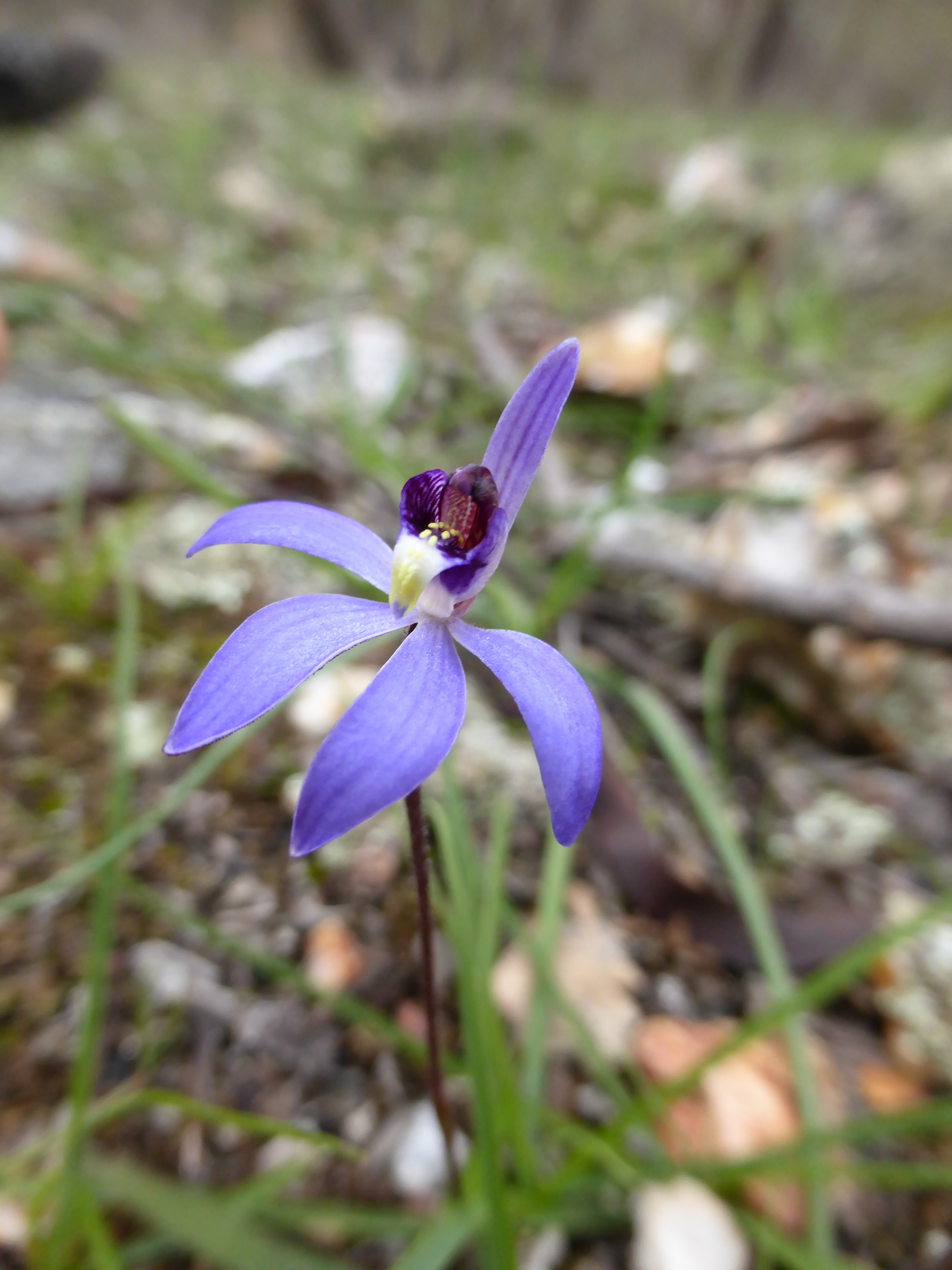Say Cheese! – New Reptile and Frog Photo Gallery
Posted on 23 November, 2017 by Asha
Jacky lizards, geckos, pobblebonks, and ‘Tuk’ the turtle are all stars of our new reptile and frog photo gallery. CLICK HERE to go to the page, where we share photos of reptiles and frogs sent in by community members. Most of these photos are from landholders involved in Connecting Country’s reptile and frog monitoring program (CLICK HERE to read more), which uses ceramic roof tiles as artificial habitat for reptiles and frogs. Tile monitoring is fantastic, but these photos also capture species that don’t use tiles as habitat, like goannas.
Thank you to everyone who shared their photos!
If you have any interesting photos of reptiles or frogs that you would like to share in our photo gallery, please send them to asha@connectingcountry.org.au
Victorian Landcare Magazine – Issue 70 – with our local winners
Posted on 23 November, 2017 by Asha
 CLICK HERE to download Issue 70 of the Victorian Landcare Magazine. This issue features the Victorian Landcare Awards, with stories about local winners: Tarrangower Cactus Control Group (page 6), Ian Higgins (page 10) and Connecting Country (page 18).
CLICK HERE to download Issue 70 of the Victorian Landcare Magazine. This issue features the Victorian Landcare Awards, with stories about local winners: Tarrangower Cactus Control Group (page 6), Ian Higgins (page 10) and Connecting Country (page 18).
There are also stories about Landcare Award winners from all over the state and a beautiful photo collage in the middle. Well worth a read.
Boosting Bulokes project helps a diamond shine
Posted on 15 November, 2017 by Tanya Loos
Thanks to Connecting Country’s Boosting Bulokes and Diamond Firetails project there are now 1,200 more young Buloke plants in the western parts of the Mount Alexander region. These slow growing trees will eventually set seed and provide a much-needed food source for seed-eating birds such as Diamond Firetails and Common Bronzewing pigeons.
Buloke trees belong to the Casuarinaceae or Sheoak family and were once abundant across the region. Bulokes are so rare nowadays that they are listed as ‘threatened’ under the Victorian Flora and Fauna Guarantee Act 1988. We wanted to help bring this threatened species back into our local area. The Boosting Bulokes and Diamond Firetails project involved 78 landholders on 23 properties, Muckleford Landcare group and the kids and teachers of the Castlemaine Steiner School and Kindergarten.

Project coordinator Bonnie Humphreys with Lisa Hall from Castlemaine Steiner School – you can see the large robust guards in the background, as well as a host of enthusiastic kids and landholders!
Bonnie prepared a comprehensive fact sheet on Bulokes, covering their ecology, threats and importantly – how to plant and care for Bulokes! The sheet can be downloaded by clicking this link: Buloke-Factsheet-CCountry.
Diamond Firetails are attractive little finches whose numbers are declining in the region. Recent studies by Grace Goddard (unpublished PhD, Adelaide University) have shown that the Diamond Firetail relies heavily on the seeds from Sheoaks as a winter food source. Diamond Firetails also eat the seeds of exotic and native grasses. However, it’s the native grass seeds that are a superior food source. The Firetails also use the long grass stems to build their nests.
We can help our declining Diamond Firetail population, by planting:
* Native grass species such as spear grasses (from the Austrostipa and Rytidosperma genera).
* Sheoak trees – the more commonly occurring Drooping Sheoak ( Allocasuarina verticillata) and of course the Buloke ( Allocasuarina leuhmenii).
For a detailed (and somewhat technical) fact sheet on Grace Goddard’s Diamond Firetail studies click this link Diamond-Firetail-Diet-fact-sheet

A Diamond Firetail strikes a pose at the edge of a bird bath, while two Red-browed Finches look on. Thanks to Nick Schulz from Nuggetty for the great pic!
Connecting Country turns ten: a picnic in the park 28 November 2017
Posted on 14 November, 2017 by Tanya Loos
Come one, come all for a picnic in the Castlemaine Botanic Gardens to celebrate our tenth birthday! This gathering aims to bring together supporters and friends from the beginning, middle and future of Connecting Country’s story.
It was 2007 when Beth Mellick of the Wettenhall Environment Trust approached the late and great Doug Ralph with an idea about landscape restoration in the region. Doug promptly called Marie Jones (who still stands on the committee today!) and a small team developed to nut out the first beginnings of what grew into Connecting Country.
Today it is 2017, and we would love you to join us in the park to reflect on the past and celebrate the future! We are keeping it casual – here are the details:
When: Tuesday November 28 at 6pm
Where: Castlemaine Botanic Gardens Tea rooms
BYO: Please bring:
* a plate of something savoury or sweet to share, and a little sign with a dietary description. Vegetarian preferred 🙂
* crockery – plate, cups, cutlery
* drinks of your choice
* A chair or two, or a picnic blanket
No need to RSVP – we will see you there!

A few familiar faces in this mob! An early planning meeting with Beth Mellick, Geoff Park, Maurie Dynon, Gib Wettenhall, and others
Fun with Phascogales – Jess Lawton’s Talk
Posted on 9 November, 2017 by Asha
At their recent AGM, Newstead Landcare invited Jess Lawton along to talk about her research on Brush-tailed phascogales (Phascogale tapoatafa). She shared some facts above about this special species, along with some interesting results from her PhD research with Andrew Bennett from La Trobe University. Jess used camera traps and habitat surveys to gather information on the habitat requirements for phascogales across central Victoria. Fifty of these sites were in the Mount Alexander region at some of Connecting Country’s nest box sites.
Jess set up two cameras at each site, pointing towards the ground where she set up a small bait station. She collected these again after 40 days, and found she had a total of 69,611 photos to go through! These included 488 phascogale records in the Mount Alexander region. One brown treecreeper also had some fun with a camera and took 952 selfies (CLICK HERE for GIF)!
Taking into account site factors such as the amount of native forest in an area, elevation, productivity, predators, tree species, number of large trees, structural complexity, logs, and leaf litter, Jess found that phascogales were present at 82% of sites. Interestingly, she found that the amount of native forest in an area was not a big influence over whether phascogales were present at a site or not. However, this could have been due to the time of year data was collected, when males may have been using sub-optimal habitat during breeding season.
The two biggest habitat factors that Jess found influenced phascogale detection were tree species (box versus gum) and leaf litter. Sites with more box species and/or more leaf litter had more phascogale records. This is probably because these provide habitat for invertebrates, which are a critical food source for phascogales.
Jess finished with some tips for landholders who wish to help with phascogale conservation:
- Protect existing hollows and put up nest boxes.
- Keep it messy – leaf litter, logs, and tree stumps and all important for phascogales.
- Help reduce predator pressure by keeping pets inside at night and walking them on a lead.
- Care for your local bush by getting involved with your local Landcare or Friends group.
Thank you Jess and Newstead Landcare for an interesting and engaging talk. Here are some pictures Jess provided from her camera traps – well worth a look!
Phascogale Facts!
I am a small nocturnal marsupial.
I am threatened species.
My range in Victoria has contracted.
My home range area is 40-100 hectares (40-50 hectares for females and 100 hectares for males).
I rely on large tree hollows with small entrances for nesting and breeding, and will use several hollows within my range.
Females of my species give birth to eight young each year. Once weaned, the litter will weigh three times the weight of the mother.
I belong to the Dasyurid family and feed mainly on invertebrates, such as insects, spiders and centipedes.
Caring for our Key Biodiversity Areas: new on ground works program
Posted on 1 November, 2017 by Tanya Loos
Connecting Country has been granted funding for a new on ground works project called ‘Caring for Key Biodiversity Areas in Central Victoria’. The special bird habitats of Clydesdale and Sandon are designated as Key Biodiversity Areas (KBAs) by BirdLife International and BirdLife Australia. The trigger species for these areas are the Diamond Firetail, Swift Parrot and Flame Robin.
The project is funded by the Victorian Government – Community and Volunteer Action Grants. In a nutshell, the project has three main components:
- Care and protection of native vegetation on private land, including actions such as supplementary revegetation, weed control and rabbit control. These actions will help enhance habitat for the trigger species for the Diamond Firetail, Swift Parrot and Flame Robin.
- Creation and installation of two attractive interpretative signs at popular parts of the Key Biodiversity areas, such as Rise and Shine Bushland Reserve, and Muckleford Nature Conservation Reserve.
- Two community events in 2018, such as a bird walk and sign launch!
The participating landholders have been contacted, and site visits will begin in early 2018.
Earlier this year, Connecting Country held a workshop in partnership with BirdLife Australia, to recruit bird survey volunteers known as ‘KBA guardians’ and provide training in how to complete an annual ‘Easter Heath Check’ form. You can read about that workshop here.
We are thrilled that this workshop generated the interest and the impetus for this grant.
There is also a very keen new group, coordinated by Friends of Muckleford Forest, which involves volunteers surveying 15 sites across the Muckleford KBA. These surveys are in preparation for the 2018 Easter Health Check. To read about Friends’ project, or volunteer, see the Friends website here.
- Learn about Key Biodiversity Areas by visiting the BirdLife Australia website: birdlife.org.au/KBA
Welcome Frances – our new director
Posted on 31 October, 2017 by Tanya Loos
It is with much pleasure that the staff and committee of Connecting Country welcome our new director, Frances Howe. Frances started at the Connecting Country offices last week in a handover with past directors Chris Timewell and Krista Patterson-Majoor. Welcome Frances, we are thrilled to have you on board!
 Frances grew up in Melbourne but fell for central Victoria during numerous childhood visits. She became a part-time Castlemaine resident in 2000, when she bought a run-down old church.
Frances grew up in Melbourne but fell for central Victoria during numerous childhood visits. She became a part-time Castlemaine resident in 2000, when she bought a run-down old church.
As an environmental scientist, for many years Frances helped assess and manage the environmental and social impacts of large development projects, across Australia and around the world. Frances has led numerous teams of environmental professionals to deliver projects spanning environmental and social baseline studies, impact assessment and management.
Frances also worked as an environmental advisor for a non-government organisation in Lesotho (Africa) and is currently a member of the management committee for The Growing Abundance Project (Castlemaine). Her qualifications include a Bachelor of Science (Honours) and Master of Environment from the University of Melbourne, majoring in ecology and conservation biology.
Having travelled far and wide, including living in the Middle East, Africa and the United States, Frances recently returned to settle in Castlemaine. She lives with her husband and dog, on a small bush block just out of town, surrounded by the Castlemaine National Heritage Park.
Frances is in the office from Monday to Thursday, leading the staff team and overseeing Connecting Country’s projects, organisational management and administration.
Nuggetty & beyond: an invitation to their 2018 calendars launch
Posted on 26 October, 2017 by Tanya Loos
Nuggetty Land Protection Group
Invites you to an afternoon tea to celebrate the launch by author and historian Peter Cuffley
of their two 2018 calendars
Nuggetty & Beyond – A patchwork of people & place
and
Nuggetty & Beyond – A glimpse of contemporary rural life
Saturday 28 October 2017, 2.30-4.30 pm
Nuggetty Winery – 5/280 Maldon Shelbourne Rd Nuggetty 3463.
Enquiries: Jane Mitchell on 0457 729 132 or janee@impulse.net.au
or
Christine Fitzgerald on 0419 347 408 or ckfitz5@bigpond.com
Those attending will have the opportunity to purchase, at a discounted price, archival quality calendars. These illustrate part of the story of settlement and agriculture in the Nuggetty area, and some of those contributing to the continuing farming community. The calendars are an initiative of the Nuggetty Landcare Protection Group. They are an outcome of the Nuggetty Landscape History project, which was originally funded by the Foundation for Regional & Rural Renewal (FRRR), the Shire of Mount Alexander and Maldon & District Community Bank.
Our 2017 Annual General Meeting: science, art and good company!
Posted on 19 October, 2017 by Tanya Loos
On Tuesday 17 October, Connecting Country staff, committee, members and friends joined together in Newstead for our 2017 Annual General Meeting.
Thanks to Brendan and Bernard for coordinating the AGM formalities. Over the next 12 months, Connecting Country remains as ably led as ever, with some new additions and shuffling of roles within the Committee of Management. In short, congratulations to Brendan Sydes (president), Saide Gray (vice president), Max Kay (treasurer) and Marie Jones (secretary) as the executive office bearers, and to Karoline Klein, Christine Brooke, Malcolm Trainor and Deborah Wardle as general committee members. We would also like to thank retiring committee member Jen Irlam for her contributions, support and insights over the past 2-3 years.
As a community-based, grass-roots incorporated organisation, Connecting Country is driven by our committee. Committee members provide their time and experience on a voluntary basis, and their participation is much appreciated! Connecting Country’s members and supporters are always able to ask questions and make suggestions to committee members – their elected represenatatives – about the organisation and its activities.
The 2017 Annual Report was also launched at the AGM, and the front cover is graced by the artwork of an Eastern Yellow Robin by Jane Rusden. Jane gave a short talk about the printmaking process, and how her beautiful Campbells Creek property and its robins inspired the artwork. The Annual Report will be available on our website soon.
Our new film was also launched! The five minute film was well received, and a great suggestion was made to get the film played in the Castlemaine and Maldon Visitor Centres. The Wild Melbourne team are doing some final technical touches and we will post it on a blog post very soon. The film featured Connecting Country staff, committee members and supporters in our quest to preserve habitat for woodland birds.
Following the film, we heard from Dr Georgia Garrard. Georgia is a Senior Research Fellow in RMIT University’s Interdisciplinary Conservation Science Research Group. Georgia’s presentation had three parts – 1) structured decision-making processes for conservation, 2) biodiversity sensitive urban design and 3) framing conservation messages for different audiences. A detailed blog post will follow – but in the meantime you can read some of Georgia’s past and present work on her blog here. Many thanks to Georgia for sharing her fascinating research with us!
After Georgia’s presentation, supper and drinks were served, with much chatting and camaraderie.
Many thanks to to Connecting Country staff and our volunteers – Sarah Edwards, Deb Shaw, Jane Rusden, Jen Pryce and Fritz Hammersley – for their assistance on the night.

Landcare facilitator Asha Bannon with new Connecting Country Committee member Christine Brooke, and Sutton Grange Landcare President Grant Workman.
Tuan Talk by Jess Lawton – Newstead Landcare AGM
Posted on 17 October, 2017 by Asha
This Thursday evening, 19th October 2017, Newstead Landcare Group is hosting a presentation by PhD candidate Jess Lawton. Jess is studying the Tuan or Brush-tailed Phascogale, a threatened and declining species of the Box-Ironbark country. The presentation will start at 8pm at Newstead Community Centre and all are welcome. A gold coin donation would be appreciated. Afterwards there will be supper and a brief AGM.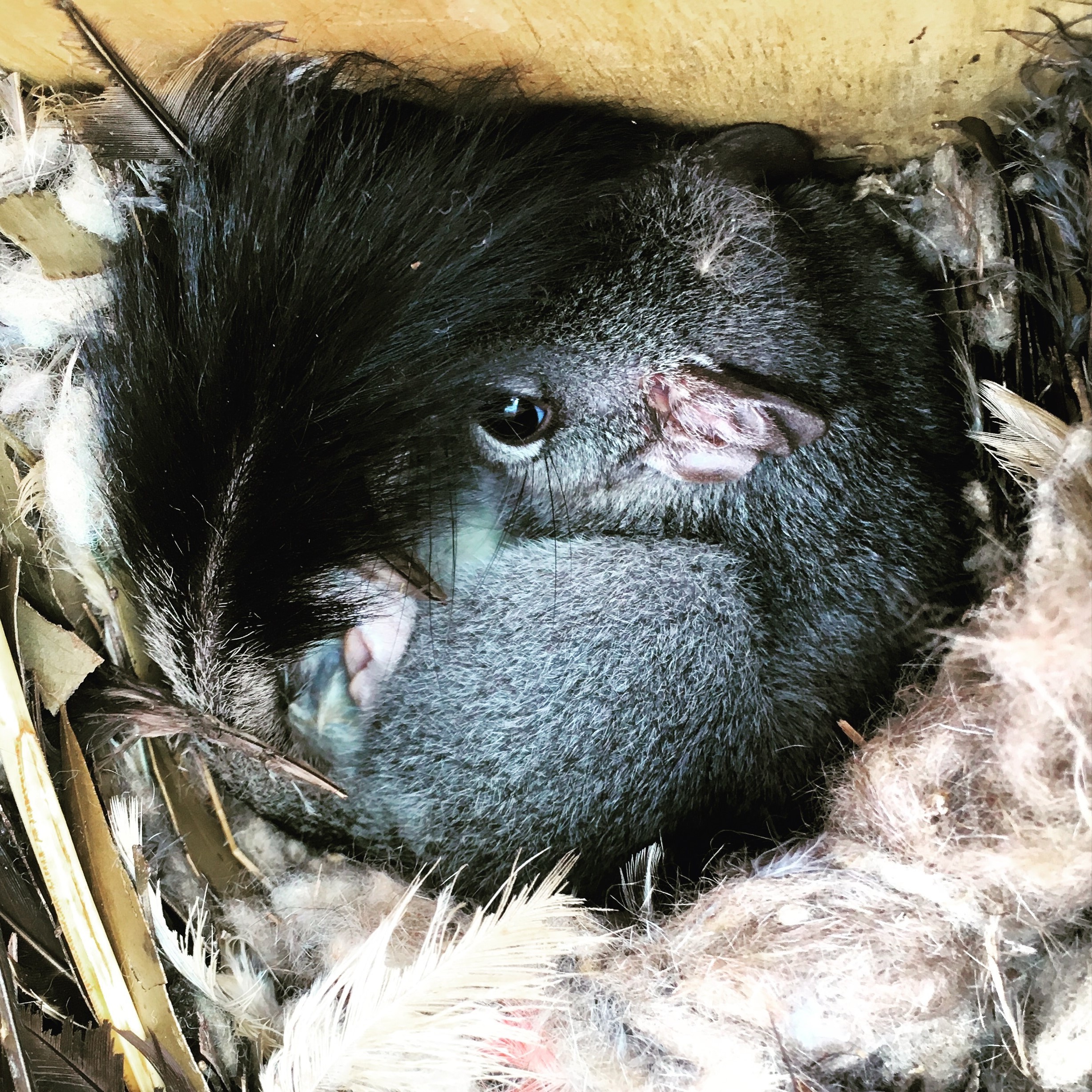
Jess says,
“The Brush-tailed Phascogale is a rare, threatened species, and is declining in Victoria. Our understanding of its conservation biology is limited because it is sparsely distributed, ‘trap-shy’, and has been difficult to survey using traditional techniques. We know that this species has a rapid reproductive cycle, whereby all males die of stress and exhaustion after their first breeding season. We also know that this species often has a large home range of up to 100 ha. Therefore, the current thinking is that it requires large areas of intact forest for a population to persist. However, this species still occurs in modified habitats, such as paddock trees, roadsides, and isolated remnant patches. The aim of my study is to see if the occurrence of the Brush-tailed Phascogale in a modified landscape relates to patch size and patch connectedness.
Connecting Country set 150 nest box sites in 2010 to provide habitat for this species through the Mount Alexander Shire. They have since monitored many of these nest box sites every two years, and now have a number of years of data on this species occurrence in the region. I selected 50 of these 150 sites, stratified according to landscape context (ie. the amount of tree cover surrounding each nest box site). Between April and June 2016, while Connecting Country conducted their nest-box checks, I set two cameras at each of these 50 sites.
In this study, I model the occurrence of Brush-tailed Phascogales in the Mount Alexander Shire with landscape attributes, such as the size of a forest patch, and a number of habitat attributes collected in the field, including forest productivity, forest structure, logs and leaf litter, and tree size and species.
One property near Axe Creek was home to a particularly active population of Brush-tailed Phascogales, and you can watch a video of the sort of footage we detected” https://www.youtube.com/watch?v=VTklMGskLyYc
Birds get a boost in the Goldfields region
Posted on 16 October, 2017 by Tanya Loos
By Tanya Loos, Connecting Country Monitoring and Engagement Coordinator
On Friday September 30, 2017, Connecting Country hosted an afternoon tea and planning meeting for the birders of the Castlemaine region. I presented some of the findings of the last six years of bird monitoring, and then the group had a discussion on the future of bird monitoring in the region. Last but not least, Fiona Blandford from BirdLife Australia gave a presentation on the merits of becoming a BirdLife Branch. It was a jam-packed afternoon, filled with energy and enthusiasm!
Preliminary findings and report
Connecting Country has been counting woodland birds since 2010 as part of our long term monitoring program. This has been undertaken by a staff member (such as myself or my predecessors) and has helped build a picture of bird species distribution across the landscape, especially in different habitats. This in-house monitoring has been quite comprehensive, but gaps still existed – so in 2014, we started a citizen science program to enlist the help of birders across the region. A whopping 20,000 bird records have been submitted to BirdLife Australia to date! The preliminary findings of the results of both programs may be found in this short report: Bird-Monitoring_Summary_Sept_2017
A more comprehensive update on this report to follow soon…
Bird monitoring in the region: banding together
We love our woodland birds in this region – there is the Connecting Country-led bird monitoring, and other initiatives as well. Lesley and Anne Perkins are continuing the bird monitoring that Ern and Lesley started some twenty years ago, with help from local birders: there are 15 sites in all. More recently, the Muckleford Key Biodiversity Area (KBA) monitoring group commenced monitoring their sites in the Muckleford forest. This group is ably coordinated by Geoff Nevill, and also has 15 sites.
We also wanted to discuss the other programs to ensure there was no double-up of sites and see if we could share methodology. After removing the double-up and including group sites – we calculated there are 84 sites being regularly monitored for birds across the region!
A follow-up blog post on the sites, survey methodology and other aspects of bird monitoring in our region coming soon…
A BirdLife Goldfields branch
Connecting Country has been an affiliate of BirdLife Australia since 2015, and we love our relationship – supporting each other’s events, and sharing data and expertise. Our nearest BirdLife Branches are in Ballarat, and to the north, in Echuca.
The Field Naturalist Clubs of Bendigo and Castlemaine, and more recently Connecting Country have filled the gap of bird activities in the region, such as the Annual Bird Count, and Swift Parrot Counts. But after discussions with key birders in the region, and with Fiona Blandford the Network Manager, we all feel it is time for a local branch!
Fiona has suggested BirdLife Goldfields – as the area covered will be Castlemaine and surrounds, including east to Baynton, south to Daylesford, up to just south of Bendigo, and to Maryborough in the west. Fiona gave us all an insight into the BirdLife model, and how branches work – and how they really can cater for the needs of the birders and communities they live in. And I am thrilled to say we already have enough interested people for a committee!
Please get in touch if you have any questions or would like to be involved in our growing bird monitoring project.
Call Tanya Loos, Monitoring and Engagement Coordinator, on 5472 1594 during work hours, or email tanya@connectingcountry.org.au
13 Oct 2017 – Travels across Australia with Robyn Davidson
Posted on 10 October, 2017 by Connecting Country
The guest speaker at the October 2017 meeting of the Castlemaine Field Naturalists Club is Robyn Davidson, who will talk about aspects of her travels in Australia.
Robyn’s first book, ‘Tracks’, an account of her journey alone across Australia, with only camels and a small dog for company, won several awards, and has been published in twenty languages. Since the book’s publication in 1980, it has never been out of print. Robyn has been travelling ever since, and has written extensively on many topics. In 2013, ‘Tracks’ was adapted into a major releases Australian film starring Mia Wasikowska and Adam Driver (click here).
The presentation is from 7.30pm on Friday 13th October in the normal location – the Fellowship Room behind the Uniting Church on Lyttleton St (next door to the Castlemaine Art Gallery). Visitors of all ages are welcome, and entry is free. RSVPs not required.
Barkers Creek bush delights in Nature News – October 3rd 2017
Posted on 4 October, 2017 by Tanya Loos
For this month’s Nature News, local landholder and member of Barkers Creek Wildlife Landcare and Wildlife Group, Lois Denham writes about the joys of getting to know the bushland on her block, and how to care for it. This article was featured on page 38 of the Midland Express, October 3rd 2017.
One of the many joys of living in the bush is observing the wildlife. Today we enjoyed watching the male blue wrens chasing females in and out of the golden wattles. Last week we saw scarlet robins, and we have been amused by the querulous, chattering choughs drinking from our bird bath.
Our soundscape includes the faint soprano sounds of the bats at night and the continuous croaking of the many frogs in our dam. We have learnt to identify some birds by their calls, but not many of the frogs! We are delighted by the kangaroos and the resident wallaby hopping through the bush; the lizard scurrying around or sunbaking on the rocks and then there is the thrill of discovering an echidna or two. No need for pets here!
My husband and I retired to live on eight acres of Box Ironbark bushland block 19 months ago. We had no desire to own much land but this block and its lovely mudbrick house and studio ‘found’ us. A friend, who is a local and an active Landcare member, informed us it was a good bush block even though it had been turned upside down by miners in the gold rush days. He also noticed that there weren’t too many weeds we would have to control. With our friend’s encouragement, we bought the property and joined Landcare with the knowledge that there would be help available to manage and continue the rehabilitation of the land.
We knew we would be on a steep but enjoyable learning curve. With the help of Landcare members, Connecting Country’s Bonnie Humphreys, and some professional assistance we learnt to identify the native plants and weeds. Our newly acquired weed management skills haver resulted in fewer invasive species and more natives on the property than were here when we moved in.
We were fortunate that there was good rain and a bumper wildflower season last spring. This year the wattles have put on a magnificent show, and I am enjoying watching many other wildflowers come into bloom. I will always remember the joy of discovering the tiny ground orchids as they emerged and I thought I had struck gold when I found our first spider orchid. I wonder how many orchids I will find this spring?
Spring at Pilchers Bridge event – Sat 7 October 2017
Posted on 2 October, 2017 by Tanya Loos
The Axe Creek Landcare Group would like people to know of their upcoming event “Spring at Pilchers Bridge”, a jam-packed program of expert speakers on the flora, fauna and management of Box-Ironbark forests.  The program includes:
The program includes:
- A bird identification walk around the Trust for Nature covenanted property, Led by Salli Dearricott, followed by a quick pancake breakfast
- A video on Indigenous Burning techniques presented by Trent Nelson, Parks Victoria and Mick Bourke, DELWP
- Orchids of the Box-Ironbark Forests by Julie Radford-Whitfield, Amaryllis Environmental
- Bushfire Preparedness by a representative from the CFA
- Wildlife, Habitat, and Nestboxes by Miles Geldard, Wildlife Nestboxes
- Flowering patterns of local Eucalypts by Bob McDonald, apiarist.
They have also asked us to let you know the following:
- Lunch can be purchased from the Eppalock Primary School Sausage Sizzle.
- Bring your own binoculars, sturdy shoes, camera and water bottle
- Free entry, pancake breakfast, tea coffee and sunscreen
- All welcome but no dogs please
Saturday 7 October.
8am to 4pm at 178 Huddle Creek Rd, Myrtle Creek
Enquiries: Chris Kirwan phone 5439 6494
Email: cwkirwan@bigpond.com
For a flier of the event, click here.
8 Sept 2017 – Banksia ecology presentation
Posted on 5 September, 2017 by Connecting Country
The guest speaker at the September meeting of the Castlemaine Field Naturalists Club (CFNC) is Simon Heyes. Simon is currently studying for his Masters in Research at La Trobe on Banksia recruitment. He is looking at why banksias aren’t regenerating, and is also researching the ecology patterns of recruitment for Banksia marginata on the plains.
The presentation is from 7.30pm on Friday 8 September in the Fellowship Room, behind the Uniting Church on Lyttleton St (next door to the Castlemaine Art Gallery). Members and visitors are all welcome, and there is no cost for entry.
To whet your appetite for Simon’s presentation, the following link is to an article written by Ian Lunt in 2014 about Banksia marginata (CLICK HERE). The comments and discussion at the end of the article are also quite interesting.
Local groups and volunteers honoured at the Victorian Landcare Awards 2017
Posted on 4 September, 2017 by Connecting Country
 Environmental groups from the Mount Alexander Shire dominated the 2017 Victorian Landcare Awards ceremony at Government House last Friday, the 1st September 2017. Connecting Country was awarded the Landcare Network Award, and the Tarrangower Cactus Control Group was awarded the Fairfax Media Landcare Community Groups Award.
Environmental groups from the Mount Alexander Shire dominated the 2017 Victorian Landcare Awards ceremony at Government House last Friday, the 1st September 2017. Connecting Country was awarded the Landcare Network Award, and the Tarrangower Cactus Control Group was awarded the Fairfax Media Landcare Community Groups Award.
Individuals were also recognised for their voluntary work; Ian Higgins, from Friends of Campbells Creek won the Australian Government Individual Landcarer award, and Ian Grenda was Highly Commended in this category.
Around 350 Landcarers from around the state gathered at Government House, with a jubilant group of 16 from the Mount Alexander region. The Landcare Awards are an opportunity to showcase people and projects that are contributing to sustainable agriculture and the protection of Victoria’s environment.
This year’s awards received significant interest from right across the state, with 85 nominations submitted across the 14 categories. Also nominated from this region were Asha Bannon for the Young Landcarer Award; and Chewton Primary and Winters Flat Primary for the Junior Landcare Team Award.
These awards are a strong testament to the energy and enthusiasm of the Mount Alexander Shire community for our natural environment. Mount Alexander Shire is incredibly fortunate to have such an active network of Landcare groups, schools and individuals working together with passion and a focus on landscape scale restoration. Congratulations to all the nominees and winners at the Landcare Awards this year.
CLICK HERE to read all of the winners’ stories from across the state.
Here are a few shots from the exciting day:
Now is the best time to try out Landcare!
Posted on 31 August, 2017 by Asha
Landcare Week is coming up next week: September 4th – 10th 2017. It’s the perfect time to get outside, get your hands dirty, and connect with other community members. We have over 30 groups in the Mount Alexander region alone, so it’s easy to find an event or working bee that’s near you and suits your interests.
Landcare and Friends groups are always looking for extra hands to help and are keen to share their knowledge of our beautiful local plants and animals. During September, there are more than eleven events being run by Landcare groups, including nature walks to learn from experts and soak up the bush, and working bees to develop some hands-on skills and help improve habitat for native species.
CLICK HERE to visit our page with information about all of the Landcare events happening in the Mount Alexander region in September 2017.
Wetland Ecology and Training Courses: October 2017 – March 2018
Posted on 31 August, 2017 by Connecting Country
Registrations are now open for Rakali’s popular wetland courses commencing October 2017 through to March 2018. The courses are presented by SERA 2016 award winning ecologist Damien Cook and Elaine Bayes. Don’t hold off as the NEW courses may be a once off depending on level of attendance and it’s the last time the Wetland Plant ID will be held in the North Central region of Victoria. Click on the following headings to find out more:
NEW: THE WONDERFUL WETLAND ECOLOGY BUS TOUR, 12 & 13 OCT 2017
Join us on a bus tour through some of northern Victoria’s most ecologically diverse wetlands that will be looking their best because of recent rainfall and flooding. Learn how ecological drivers determine wetland ecology. Dixie Patton, Barapa Traditional Owner will share knowledge on aboriginal uses of these amazing wetlands. Other land managers will meet us along the way.
NEW: WETLAND RESTORATION AND MANAGEMENT, 16 & 17 NOV 2017
Learn about wetland restoration and management over 2 days with Damien Cook by visiting ‘Waterways’; a SERA 2016 award-winning wetland restoration project which he was involved in planning and implementing, followed by the 200 hectares of coastal park at the Victorian Desalination Plant, Wonthaggi. Learn more about these projects here.
WETLAND PLANT IDENTIFICATION DAYS, STARTS OCT 2017 – MAR 2018
Learn to identify the most common wetland plants. In order to manage or restore a wetland you first have to thoroughly understand it. Wetland plant species, condition and placement within a wetland can inform you as to what is going on. You can choose 1, 2 or all 3 days – Each day is timed to follow the wetting and drying of the stunning Reedy Lagoon at Gunbower Island or nearby wetlands so each plant guild can be seen in their splendor.
- Day One: Sedges, Grasses and Rushes
- Day 2: Aquatic Plants
- Day 3: Mudflat specialists.
Click here for more information and to REGISTER. Alternatively contact Elaine Bayes at Rakali Consulting 0431 959 085 or email elaine@rakali.com.au. Each course can be done as an individual unit or as a complete package (ask Elaine about discounts).
20 Million Trees Connects Woodland Bird Habitat
Posted on 30 August, 2017 by Asha
Four Landcare groups, six sites, and over 6300 plants! Over the past 18 months Baringhup, Harcourt Valley, Sutton Grange, and McKenzie’s Hill Landcare groups have been working hard on a landscape-scale revegetation project funded through the Federal Government’s 20 Million Trees Programme. With the help of community volunteers, the Green Army team, and local contractors, the Landcare groups have revegetated private and public land across the region creating and connecting important habitat for our threatened woodland birds.
The photopoints below are taken from the same location at one of Baringhup Landcare’s 20 Million Trees sites along the Loddon River. The first was taken before planting in 2016, the second after planting in 2017. As you can see in the second photo, the revegetated plants are thriving at this site! Birds in abundance were already enjoying the new habitat on the sunny day it was taken.
Well done to all the Landcare groups involved in this project and this amazing achievement.
This project was supported by the 20 Million Trees Programme, through funding from the Australian Government’s National Landcare Programme.
31 August 2017 – The Genius of Birds
Posted on 24 August, 2017 by Connecting Country
On Thursday 31 August 2017, the Castlemaine Library is hosting a presentation by American science writer and New York Times bestseller Jennifer Ackerman. Jennifer will talk about her latest book, The Genius of Birds, which explores the latest international scientific research on our feathered friends. Once you have seen Jennifer’s presentation, no doubt you will consider ‘bird brain’ to be phrase used as a great compliment!
The presentation commences at 5.30pm. Entry is free, but bookings are required (click here for link to the booking website). The library has let us know that there are a small number of openings still available.
Jennifer Ackerman has been writing about science, nature, and health for more than 25 years. Her work aims to explain and interpret science for a lay audience and to explore the riddle of humanity’s place in the natural world, blending scientific knowledge with imaginative vision. She has won numerous awards and fellowships. There is further information about Jennifer on her website (click here).
Local wildlife sound recordist Andrew Skeoch is a huge advocate for Jennifer’s book and the research that she has compiled. CC staff member Chris is reading it at the moment – and is also fascinated by the findings.


